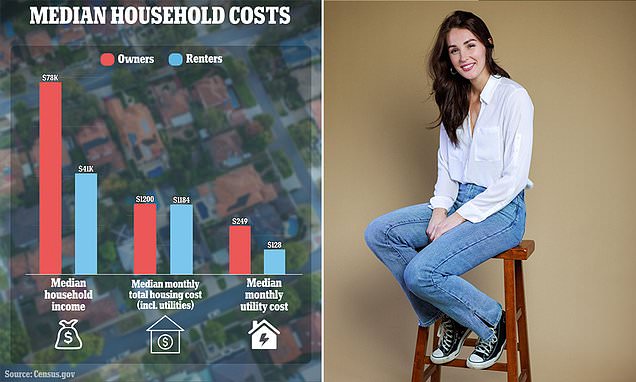
- Real estate developers are responding by buying up single-family homes and turning them into rental properties, or building amenity-filled apartments
- Many people who can afford to buy homes are choosing not to because they don’t think the price they would have to pay currently is worth the investment
- In total there were about 44 million rented households by the end of 2021, according to US Census data, with the median income sitting at $71,000
Rich Americans are choosing to rent instead of buy homes due to soaring house prices, inflation and record-high mortgage rates.
The number of households rented by people making more than $150,000 in the US spiked to more than three million between 2016 and 2021, a staggering 87 percent increase, numbers from the US Census Bureau showed.
In total there were about 44 million rented households by the end of 2021, the Census found, with the median income sitting at $71,000.
Rising costs of home-buying have left many such as Lee Robins, a 36-year-old accountant making six-figures in Sanford, Florida – where median house prices are over $100,000 – needing more time to save to buy.
He told the Wall Street Journal he’ll likely need to keep renting a two-bedroom apartment with his family for a few more years.
Even renters who can afford to buy, like 30-year-old Richmond business owner Jessica Bronner, have decided against making purchases. She told the Wall Street Journal, ‘the market’s still very inflated and it doesn’t make sense to buy.’
The largest increase in affluent renters was seen in Austin, Texas.
There households rented by people making more than $150,000 increased by 154 percent between 2016 and 2021, according to date from RentCafé.
Austin’s increase was part of a trend seen across the southwest, which saw masses of people relocate during the COVID-19 pandemic, increasing rents and transforming the market.
And even though the numbers of Americans making six-figures has increased too, rising prices associated with home buying and ownership have left those high-earners deciding that home ownership is not worth the money and that renting and putting money into the stock market is a better option to grow wealth.
High-earners also tend to be pickier about what they buy, according to the Wall Street Journal, leading them to pass on purchases until something that fits exactly what they want becomes available at a price they can afford.
The market has been responding in turn, with developers buying up single-family homes and turning them into rentals, or apartment complexes chock-full of amenities being churned out for well-heeled clientele.
‘They really demand what they want, because they’re able to pay for it,’ said an executive at the real-estate investment company Capital Square, Whitson Huffman.
Experts warned that the rental market’s turnover and supply leads to a much more competitive environment, meaning current trends towards supplying the wealthy with apartments is driving up rental costs.
‘There are markets that are already tough on lower- and middle-income renters, and it’s just becoming more difficult with this influx of higher-income earners,’ Harvard University housing researcher Whitney Airgood-Obrycki told the Wall Street Journal.
Though rents have abated slightly from the post-pandemic boom, numbers from Realtor.com released in 2022 found rents had nonetheless remained considerably higher than they were before the pandemic in major cities.
Chicago rents rose 23.9 percent by last September, in Miami they were up 51.8 percent, Tampa saw a 40.9 percent increase, and Memphis posted a 37.5 percent increase.
The report showed that median rent across the country as a whole rose 7.8 percent last month, and remained a whopping 25 percent higher than pre-pandemic rents.
Numbers from the US Census Bureau found the median household income for renters was $41,000, and the median for homeowners was $78,000.
The median monthly housing cost for homeowners and renters was similar coming in at $1,200 and $1,184 respectively.
Homeowners paid more for monthly utilities at $249, while renters paid $128.
Thirty-five-year-old tech entrepreneur Al Hughes told the Wall Street Journal he and his wife moved from the east coast last year and moved to California.
He said they didn’t find anything to buy there that was a better value than renting, so they picked up a lease on a 1,400-square foot house with a garage and backyard for $2,400 per month.
‘We want a backyard, but we don’t want to necessarily have to take care of it all the time,’ Hughes told the Wall Street Journal. ‘We don’t really have an interest in buying anymore.’
Robbins said his student loans were still making it difficult for him to get a mortgage.






